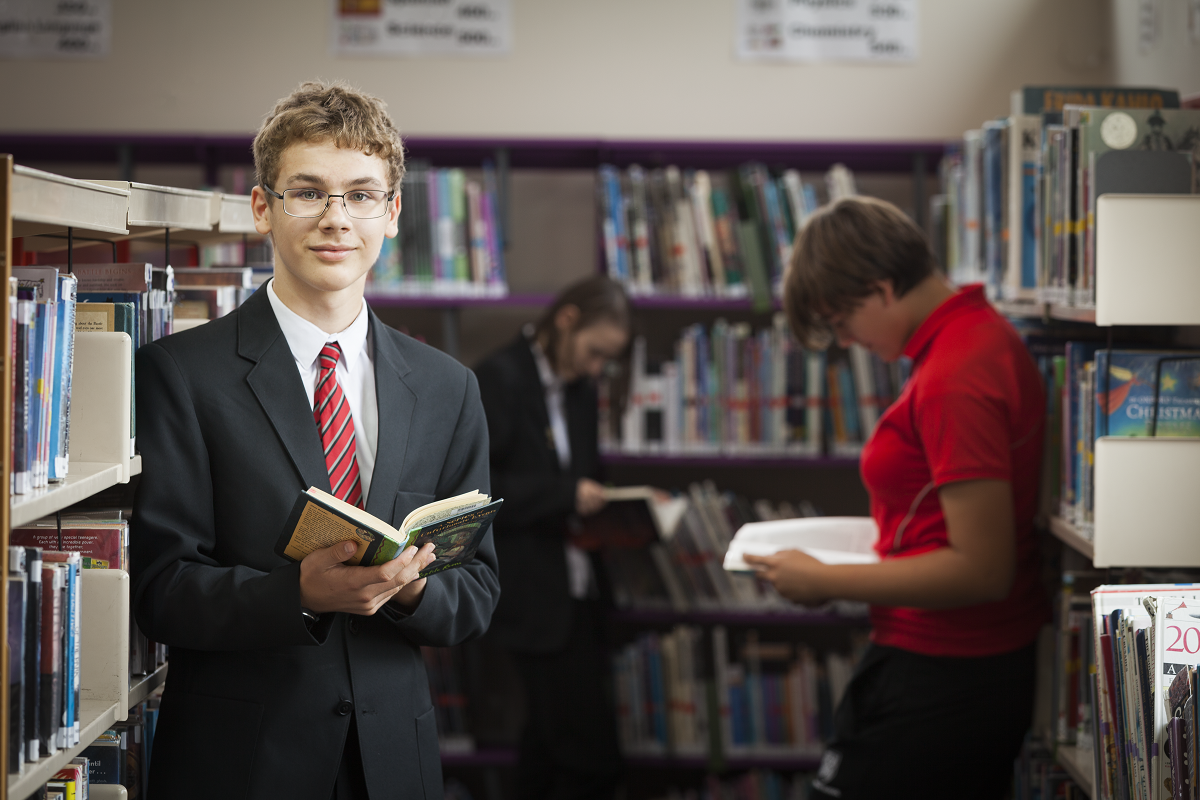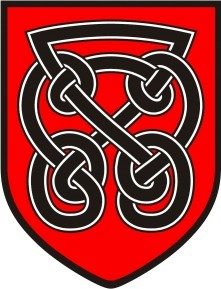
The Library is staffed by our dedicated and enthusiastic librarian, whose role is to support independent learning in the school and to encourage students to maintain their interest in a wide range of reading material. The Library is a vibrant space, with active reading and learning an integral part of its routine.
Some areas and activities to highlight include:
- The Library holds a varied stock of popular children’s fiction and curriculum appropriate non-fiction to support homework.
- We have multimedia resources, including DVDs, audio CDs, and Kindles.
- Year 7 students undergo a programme of instruction in how to use the Library effectively.
- To support the maintenance of a reading culture throughout the school, the English curriculum allows for fortnightly lessons in the Library for Year 7, Year 8 and Year 9.
- In Year 8 and Year 9, Library lessons consist of book-focused activities, with chances to win prizes.
- The Library catalogue is networked throughout the school, allowing staff and students access from all computers on the site. It is also available from home via the Remote Access icon on the website.
- Students use their Smartcards to borrow books. All students are allowed to borrow two fiction books and two factbooks, each for up to two weeks.
- Students are welcome in the Library at break, lunchtime or after school to study, do homework or to read.
- Library and Literacy Leaders contribute to the displays in the Library and have had book reviews put on display in Waterstones.
- Library and Literacy Leaders also conduct student surveys and are involved in choosing Library stock.
- Book Week is held in November each year and includes visiting writers and competitions and we celebrate World Book Day with a range of exciting initiatives.
- Students have been involved in shadowing the Carnegie Medal (the national children’s book award) and the annual North Herts Children’s Book Award.
- Our Staff Challenge annually encourages all staff to read the latest books for young people.
- We hold a week of workshops for local Primary School students.
- The Library has a link to Scholastic, a very good supplier of children’s and young adult fact and fiction books. Every book bought via Scholastic will give us reward points to spend on books for our Library. So, while buying excellent resources for your children you support the school library at the same time. Please see the link below for details.
Reading at TPS
“He that loves reading has everything within his reach.” – William Godwin
Our aim is for students to leave The Priory School having had a rich and positive experience of reading. We strive to expose our students to multiple, diverse, challenging texts in the classroom, which will in turn give them the confidence and power to choose books for themselves when reading for pleasure; we want our students to discover the transformative power of books, the power of escapism and the pleasures that reading affords.
Reading as a core skill
We understand the importance of reading for success within all curriculum areas, and so we aim to support our students who struggle with reading with a range of interventions.
KS2 SATs data provides us with a scaled score for reading that helps us to quickly identify students whose reading is below the expected standard. Alongside this, all students in Year 7 complete a series of baseline tests at the beginning of the academic year to provide us with additional data to help ensure that all students get the support that they need. Once we have identified the students, we can then use a range of targeted interventions to help improve their reading skills:
1) Paired reading with Teaching Assistant focussing on decoding and comprehension during registration time.
2) LEXIA – An online, personalised approach that targets skill gaps as they emerge and provides us with student-specific resources needed to plug those gaps. It covers the 5 elements of reading: phonological awareness, phonics, structural analysis, fluency, vocabulary and comprehension.
3) LEXONIK ADVANCE – A small group intervention that runs for 1 x hour for 6 weeks, leveraging metacognition, repetition, decoding and automaticity. Lexonik Advance trains learners to develop phonological awareness and make links between unknown words using common prefix, root word and suffix definitions.
4) LEXONIK LEAP – Lexonik Leap effectively resolves phonics gaps for learners who find literacy particularly challenging and those for whom English is not their first language; rapidly progressing reading, spelling and oracy.
5) ‘Improving Reading Comprehension and Enjoyment’ – small group KS3 intervention to boost understanding.
6) Short-term, targeted support for students with specific literacy barriers focussing on improving phonics, spelling and fluency.
Staff are given the reading data for their students, so they will be aware of the students who are likely to struggle to access reading materials in their classroom. Students who have need are trained to use the assistive technology to support with reading and are encouraged to use this technology in lessons to be able to read and access texts independently.
Staff are encouraged to model good reading to students; making use of prosody (intonation/stress/rhythm) and pace to help students engage with texts and help with understanding.
Reading for pleasure
We understand the academic importance of reading, but we also understand that reading has social and emotional benefits. It increases self-esteem and studies show that students who read are more empathetic. Growing up is tough; reading can help young people explore complex problems from the safe fictional world of a book.
The problem, of course, is convincing young people of the importance and joy of reading.
In KS3 we have library lessons once a fortnight that allow students access to the library and all its resources. At the beginning of each year students complete a reading survey that provides us with some really useful information about students’ current reading habits and general attitude to reading. This allows us to target students who might need a little extra help or encouragement with reading. Any student with a low reading scaled score is also targeted through library lessons to read aloud to a member of staff to help build their confidence and fluency with reading.
Initially, in Year 7, the focus in library lessons is just about getting students familiar with how the library works (Dewey reference system, using the library catalogue to search the library etc.) and encouraging them to experiment with a range of books and texts in the library. It is a time and space for them to read without distractions. We have an excellent librarian with a wealth of knowledge and she ensures that any reluctant or weak readers are spoken to about their interests so we can find a book for them to enjoy. We have access to Kindles and audiobooks that are really useful for our weak or reluctant readers to ensure they can still find pleasure and enjoyment in books.
In Year 8 and Year 9 we have termly projects that students complete in their library lessons. These projects are designed to get students to engage in reading alongside teamwork and oracy skills.
Although KS4 students do not have specific library lessons, they are given the opportunity to access the library once a half term through form time to ensure that they are given time to browse the library and choose a book.
Reading habits
To help make reading a habit for our students, we make use of form-time activities to expose students to a range of different texts to help explore complex ideas around identity and diversity and to raise their aspirations.
In addition, all of our Year 7 and Year 8 students are required to keep a reading record that forms part of their weekly English homework. These reading records are shared electronically with their class teachers and are used in library lessons to facilitate discussions with the students about the books they are reading. Their reading record is also supported by a range of challenge activities (discussion prompts, re-writing the blurb, re-designing the book cover, re-writing the ending etc.).
Recommended Reads
Complex Issues – Books To Make You Think
Links
Staff
- Mrs Meike Perkins – Librarian
